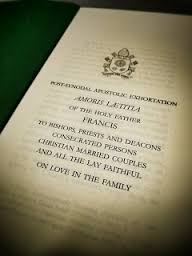
Another Canadian Senator, the Liberal Colin Kenney, has been caught using public money, and his servants’, sorry, his staff’s, time to do personal business for the esteemed member of the Upper House of ‘sober second thought’. These included renovations on his private residence and disinfecting the beds in his privately-owned tanning-salon business. Shades of Mike Duffy, Pamela Wallin and all the rest of the entitled class. Thirteen other Senators were also investigated for dubious, if not outright immoral, use of public monies.
But I do pity them: After all, as the Mr. Duffy trial made clear, the financial fiduciary rules were so vague, so nebulous, that lines were easily crossed: How were they supposed to govern themselves without a clearly promulgated and enunciated law?
The same thoughts came into my mind as I read through Amoris Laetitia, much of which is beautiful, moving and filled with solid practical advice. The more controversial bits arrive in the now much-discussed-and-analyzed Chapter 8.
In a webinar I gave a few days ago now on the recently-released Exhortation, I made a distinction between orthodoxy and orthopraxy. The former refers to ‘right teaching’, the propositional, dogmatic teaching of the Church. The latter refers to the Church’s practice of instantiating and applying that teaching, especially to concrete, pastoral situations. The Holy Father in Amoris seems to be trying to maintain orthodoxy, while extending, one might say stretching, the praxis of the Church, especially her sacramental discipline, to bring, or to keep, the lost and straying sheep into the fold, especially the ‘divorced and remarried’ and those involved in what he euphemistically calls ‘irregular’ situations.
Pope Francis seems to think that the sacramental and canonical law currently in place is in certain circumstances too burdensome, and one may, or even must, go outside or beyond the law. In the abstract, he has a point. After all, Saint Thomas says that sometimes one must perforce act praeter legem, beside the law, in accordance with the intention of the lawmaker, rather than with its strict literal interpretation, particularly in emergency situations.
This is in accord with the purpose of law itself, which is to help us avoid sin, disorder and chaos, and lead us to virtue, truth and harmony. If the law ceases to be a means to this end, then it must be transcended. In Thomas’ pithy phrase, necessitas non subditur legi, necessity is not subject to law (I-II, q. 96, a. 6).
We must be careful here, however, in making the proper distinctions. Saint Thomas is talking about human, positive law, crafted by men for society, laws which he clearly states are always somewhat imperfect and proportional to the common good of that particular society. He makes no provision for any violations of the natural-moral or divine law, and the Church has reiterated the inviolability of the moral law from the very beginning. When Thomas asks whether law binds us in conscience (I-II, q. 96., a. 4), he says that it does, because much of law simply clarifies what is already in the divine or moral law. Only if the law is about other more contingent matters can we in certain cases disobey, or more properly act beside the law’s letter, if the law be unreasonable, either in itself or in those particular circumstances.
In general, however, we should obey the law, for our own reason is uncertain, while laws are (one hopes!) framed by wise men with much aforethought, so we should not rest too easy in justifying the breaking of law. Furthermore, violations of law may easily cause scandal and disturbance, along with some degree of disdain for the lawmaker.
Law, in fact, should give certainty and serenity to the conscience, that one is acting in accordance with the will of God, as manifested through the authority He has vested with some degree of His own power. Without law, no society could function, not least the Church, for we would be left to the tangled labyrinth of our own disordered and self-justifying consciences, which would in turn lead to great evil and chaos. Saint Paul goes so far as to describe the anti-Christ as anomos, the ‘man of lawlessness’, who will rebel against the law of God, echoing the original temptation of the first Man in the garden, ‘ye will be like gods’, to make a law unto yourself, disobeying the law of our Creator, written on our very hearts and minds.
It is with these caveats that we should read Chapter 8 of Amoris Laetitia, especially the section on using one’s conscience as a guide to determine one’s moral state, prescinding from the law of the Church. Of course, conscience is the court of last appeal, the proximate norm of morality as Pope John Paul II declared in Veritatis Splendor, the aboriginal Vicar of Christ, in Bd. Cardinal Newman’s vivid analogy. In his insightful Letter to the Duke of Norfolk, the Oratorian also declared that
if I am obliged to bring religion into after-dinner toasts, (which indeed does not seem quite the thing) I shall drink—to the Pope, if you please,—still, to Conscience first, and to the Pope afterwards.
However, one must be cautious here, for in the whole preceding section of this lengthy missive, Newman is at pains to make clear that the Pope and the Magisterium, and we may add the whole body of revealed doctrine, along with all the Church’s laws and edicts, are there to be the primary guide for our conscience. As the Declaration on Religious Freedom, Dignitatis Humanae, declares, one is bound to seek the truth, and once one is aware of a conclusion of natural or divine law, as revealed and defined by the Church, one is bound to hold and keep it.
As may have been expected, the Holy Father in Chapter 8 gives no permission to deliberately violate divine or natural law. What he does seem to do in Chapter 8 may be reduced to two things:
First, he offers some freedom to Catholics to discern whether certain disciplinary laws, particularly about marriage, fail in some cases to reveal the objective truth of their situation (e.g., the validity, or not, of the first marriage).
Second, he suggests that even in clearly non-marital situations, some people may not be fully culpable for breaking the moral law.
To those in the first case, those in ‘irregular situations’ that may approximate marriage, the Holy Father exhorts them to examine their conscience, for example, the state of their ‘first marriage’, their own level of guilt in the breakdown, who was hurt, and so on. However, they (and we) must beware that they are not justifying grave evil for the sake of some temporal good. Although the guilt in any marital separation may vary, we cannot take these words to mean that one can self-administer one’s own personal annulment (nor, on the other side, can one in the interior and secret realm of conscience ‘make’ oneself married to another). The Pope’s words here are somewhat ambiguous and easily misinterpreted, and I hope that clarification is offered to those in such situations, that they quickly seek a decision in law for the state of their new ‘union’ before joining as ‘man and wife’. We must recall that if an annulment is not an infallible decree (the marriage may still be ‘real’), far more fallible is our own hazy and rationalizing conscience.
To those in the second category, here is the rub: Adultery and fornication are grave objective moral evils, and we are bound to avoid them, even if it means great sacrifice or even death, as the untold number of martyrs in the Church’s calendar attest. For these acts to be ‘mortal sins’, however, one must carry them out with full knowledge and deliberate consent. One may therefore be ignorant of the moral law, and the Pope quotes Saint Thomas on this in I-II, q. 94., a. 4, but Thomas is speaking principally of pagan cultures who have not had the fullness revelation, or any revelation at all. This would be difficult to justify in our modern era, where almost everyone has access to the Church’s teaching, especially if they are coming to a Catholic Church for the sacraments.
One may also not be fully free not to do the act, that is, the will is coerced in some way, and this seems a more likely scenario. Women in particular are sometimes forced into ‘irregular’ situations’ for various economic or cultural reasons, especially in very poor countries. They may engage in cohabitation, and sexual acts within these unions, to which they do not fully consent.
What we must not do is take these very unusual, and hopefully very rare, situations to provide any sort of general norm. The universal and regular way of proceeding must always be by the law, which means the natural law, as clarified by the Code of Canon Law, the Catechism, the teachings of previous Pontiffs, and the disciplinary procedures of the Church, and not solely by one’s own personal discernment, with or without a pastor.
As Canon 915 states:
Those…obstinately persevering in manifest grave sin are not to be admitted to Holy Communion
Note that it says ‘grave sin’ and not ‘mortal sin’. Once we have consented to an act gravely contrary to the moral law, we must go to Confession, with a firm purpose of amendment not to sin again. To deliberately flout the law would bring great harm to one’s conscience, and to one’s soul.
The process of rationalizing ‘grave sin’ as not mortal, or not even serious, is a widespread modern error. As Pius XII warned at the beginning of his great encyclical Humani Generis (also quoted in the Catechism):
The truths that have to do with God and the relations between God and men, completely surpass the sensible order and demand self-surrender and self-abnegation in order to be put into practice and to influence practical life. Now the human intellect, in gaining the knowledge of such truths is hampered both by the activity of the senses and the imagination, and by evil passions arising from original sin. Hence men easily persuade themselves in such matters that what they do not wish to believe is false or at least doubtful. (H.G., # 2; cf., CCC #37)
Read over the last sentence once or twice again, and reflect upon how often that has applied to us. The same Pontiff also declared in a radio address in 1946 that the greatest sin of the twentieth century was the ‘loss of the sense of sin’. And just last October, in a very rare interview, Pope Emeritus Benedict declared that the Church has to deal with the modern error of seeking mercy without some level of repentance and conversion.
Of course, the reality behind the law will always be greater than the law itself. After all, law, and even the sacraments themselves, are a means to an end, to bring each individual soul to eternal bliss with God. As the Catechism declares, although God has bound salvation to the sacraments, He Himself is not so bound, and He may lead souls to heaven outside the Church’s law and sacramental economy (#1257). We, however, should beware of the deadly sin of presumption, keeping in mind that the Church’s law and the sacraments are the only certain means we have to attain this final end, which is why the Dogmatic Constitution of the Church, Lumen Gentium, declares that those outside the visible Church may all the more easily be deceived by the Evil One, and led to final despair (# 16.3), and that those who recognize the Church, but refuse to enter or persevere therein cannot be saved (#14.1).
No one, Catholic or not, can justify himself, nor lead himself to heaven. Rather, we must be purified, healed and elevated by God’s sanctifying grace as we journey through the tangles and pitfalls of this life, and the primary way we can be morally certain of this ‘state of grace’ and our growth in holiness is by the sensible, visible sacraments, and the laws of the Church that surround them.
In the vivid words of Thomas More to his future son-in-law Roper, warning against circumventing the law to achieve an apparent good:
Oh? And when the last law was down, and the Devil turned ’round on you, where would you hide, Roper, the laws all being flat? This country is planted thick with laws, from coast to coast, Man’s laws, not God’s! And if you cut them down, and you’re just the man to do it, do you really think you could stand upright in the winds that would blow then? Yes, I’d give the Devil the benefit of law, for my own safety’s sake!
If the saint and martyr said this of the imperfect human laws in the reign of the even-more imperfect Henry VIII, should this not also be said even more so of canonical and ecclesiastical law? Such laws are there for our sake, not God’s, and we should not tread outside them lightly, for to do so not only endangers one’s own soul, but those of others with the risk of scandal, which is why Pope John Paul II in his own post-Synodal 1981 Exhortation on the family, Familiaris Consortio, warned of those in ‘second’ marriages:
…the Church reaffirms her practice, which is based upon Sacred Scripture, of not admitting to Eucharistic Communion divorced persons who have remarried. They are unable to be admitted thereto from the fact that their state and condition of life objectively contradict that union of love between Christ and the Church which is signified and effected by the Eucharist. Besides this, there is another special pastoral reason: if these people were admitted to the Eucharist, the faithful would be led into error and confusion regarding the Church’s teaching about the indissolubility of marriage. (#84)
In light of this warning of the previous Pontiff, we must be very careful how we interpret some of the phrases in chapter 8 of Pope Francis’ Exhortation (and Francis obliquely warns us of such misinterpretation), so that traditional Church law and sacramental teaching remain firmly intact, and our consciences are able to see the truth clearly, especially in the realm of married and sexual love, where our most powerful emotions are involved. For upon the integrity of the family depend not only the happiness and fulfilment of those we love, or should love, but the very existence of society itself.
 Saint Catherine of Siena (1334-1380) was a feisty, indomitable woman. One might, in a Catholic way, claim her as an early ‘feminist’, in the true JP II sense of that term, recognizing the genius, and the power, of woman, and her role in the Church.
Saint Catherine of Siena (1334-1380) was a feisty, indomitable woman. One might, in a Catholic way, claim her as an early ‘feminist’, in the true JP II sense of that term, recognizing the genius, and the power, of woman, and her role in the Church.





 ain size, the lungs and heart would cease to function, to say nothing of the brain.
ain size, the lungs and heart would cease to function, to say nothing of the brain. What of the Netflix Daredevil series? Again, I will admit that I watched the first season, being a fan of the comics when I was of the age to read such things, now, yes, of the age to watch them. Like Batman, the character always intrigued me, being a ‘self-made’ superhero, relying by and large upon his own developed skills, with a bit of help from heightened senses. Also, like Batman, Daredevil was vulnerable, and his Catholicism, his struggles with his conscience and the morality of his actions, added to the drama.
What of the Netflix Daredevil series? Again, I will admit that I watched the first season, being a fan of the comics when I was of the age to read such things, now, yes, of the age to watch them. Like Batman, the character always intrigued me, being a ‘self-made’ superhero, relying by and large upon his own developed skills, with a bit of help from heightened senses. Also, like Batman, Daredevil was vulnerable, and his Catholicism, his struggles with his conscience and the morality of his actions, added to the drama.